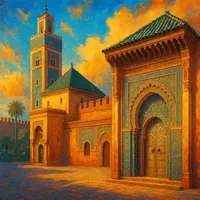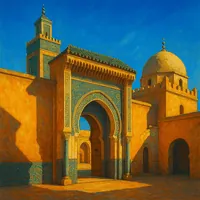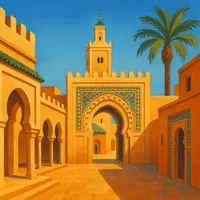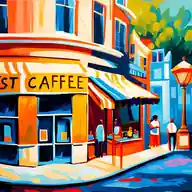Oujda-Angad stands out as Morocco's eastern gateway, where the vibrant Maghreb spirit meets rich Andalusian influences, echoes of its illustrious past as a transit hub on ancient trade routes. Unique to Oujda is the annual Festival of Gharnati Music, a captivating celebration of its distinct Andalusian musical heritage, seldom found elsewhere in Morocco. The luscious Sidi Maâfa forest, an oasis within the city, provides rare biodiversity, transforming Oujda into an urban sanctuary blending culture and nature.

Destinations

Travel Tips & Planning

General City Overview
Notable points about Oujda-Angad
- Cultural Gateway: Oujda-Angad, located in northeastern Morocco, serves as a cultural gateway between Morocco and Algeria. Its unique blend of Moroccan and Algerian influences makes it a fascinating destination for those interested in exploring cross-cultural traditions and experiences.
- Historical Significance: The city is home to the historic Bab Sidi Abdel Wahab gate, dating back to the Almohad era. This site offers history enthusiasts a glimpse into the medieval architectural prowess that distinguishes it from many modern cities.
- Music and Festivals: Oujda is famous for hosting the annual Oujda Rai Festival, an event celebrating the vibrant Rai music style. Music lovers around the world are drawn to this festival for its energetic performances and eclectic ensembles.
- University Hub: The city is notable for its educational institutions, like Mohamed I University, attracting students from across Morocco and beyond, infusing the city with a youthful and vibrant atmosphere ideal for singles or young professionals looking for intellectual engagement.
- Tranquil Environment: Compared to the bustling metropolises of Rabat or Casablanca, Oujda offers a laid-back, serene environment, characterized by its vast parks and gardens, making it a peaceful retreat for retirees or older individuals seeking a quieter lifestyle.
- Family-Friendly Attractions: Families will appreciate the Parc Lalla Aicha, a sprawling park offering recreational spaces, picnic spots, and amusement rides, providing a welcoming space for children and parents to enjoy leisurely activities together.
- Culinary Delights: Foodies can indulge in traditional eastern Moroccan delicacies, such as Maakouda and Briouat. The local cuisine presents a distinct taste, featuring unique spices and preparations not commonly found in other parts of Morocco.
- Diverse Religious Heritage: The city is home to both historic mosques and new churches, indicative of its religious diversity and tolerance, offering spiritual and cultural insights for visitors of various beliefs.
- Industrial Growth: Oujda-Angad is increasingly recognized for its industrial development, with growing sectors in renewable energy and manufacturing, appealing to entrepreneurs and investors looking for emerging markets.
- Proximity to Natural Wonders: Unlike other Moroccan cities, Oujda offers easy access to the scenic Beni Snassen mountains and the picturesque Mediterranean coast, granting outdoor enthusiasts numerous opportunities for hiking, exploring, and seaside relaxation.
Summarized User Reviews
The medina feels untouched by time—quiet, real, and full of stories. I stumbled into a courtyard concert and didn't want to leave.
The city’s a bit sleepy outside festival season, but if you dig deeper, the local cafes and music halls reveal its soul.
Loved the street food—grilled brochettes near Place 16 Août were unreal. And people actually *talk* to you without trying to sell something.
Honestly, if you’re looking for tourist thrills, it might feel slow. But as a cultural stop, it has layers you won’t find in bigger cities.
The Rai music festival blew me away. It’s the kind of thing that makes you feel plugged into the spirit of North Africa.
Interactive Word Cloud for Oujda-Angad

















































































































